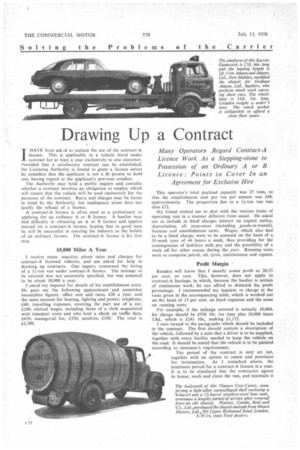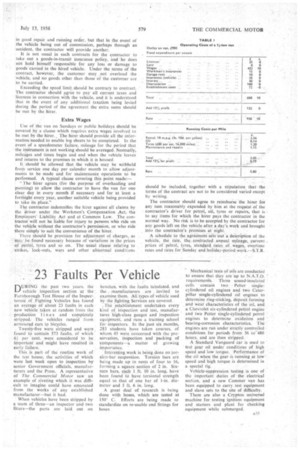Drawing Up a Contract
Page 70

Page 73

If you've noticed an error in this article please click here to report it so we can fix it.
Many Operators, Regard Contract-A Licence Work As a Stepping-stone to Possession of an Ordinary A or B Licence: Points to Cover In an
Agreement for Exclusive Hire
IHAVE been ask.:41 to explain the use of the contract-A licence. This is applicable to a vehicle hired under contract for at least a year exclusively to one customer. Provided that a satisfactory contract can be established, the Licensing Authority is bound to grant a licence unless he considers that the applicant is not a fit person to hold one, having regard to the applicant's previous conduct.
The Authority may hold a public inquiry and consider. whether a contract involves an obligation to employ which will ensure that the vehicle will be used exclusively for the purposes of the contract. Rates and charges may be borne in mind by the Authority, but inadequacy alone does not iustify the refusal of a licence.
A contract-A licence is often used as a preliminary to applying for an ordinary A or B licence. A haulier may find difficulty in obtaining an A or 13 licence and applies instead for a contract-A licence, hoping that in good time he will be successful in entering the industry as the holder of an ordinary licence. The contract-A licence is h:s first step.
10,000 Miles A Year I receive many inquiries about rates and charges for contract-A licensed vehicles, and am asked for help in drawing up contracts. One inquiry concerned the hiring of a 11-ton van under contract-A licence. The mileage to be covered was not accurately specified, but was assumed to be about 10,000 a year.
I asked my inquirer for details of his establishment costs. He gave me the following approximate and somewhat incomplete figures: office rent and rates, £20 a year, and the same amount for heating, lighting and power; telephone, £40; travelling expenses, covering the part use of a car, £200; clerical wages, including those of a clerk acquainted with transport costs and who kept a check on traffic data, £450; managerial fee, £350; sundries, £100. The total is £1,180. This operator's total payload capacity was 25 tons, so that the establishment cost per ton per annum was £48, approximately. The proportion due to a 11-ton van was thus £72.
My friend wished me to deal with the various items of operating cost in a manner different from usual. He.asked me to include in fixed charges interest on capital outlay, depreciation, all insurances (including „goods-in-transit), licences and establishment costs. Wages, which also had to be a fixed charge, were to be assessed on the basis of a 55-week year of 44 hours a week, thus providing for the contingencies of holidays with pay and the possibility of a week off for other causes during the year. Running costs were to comprise petrol, oil, tyres, maintenance and repairs.
Profit Margin ' Readers will know that I usually assess profit as 20725 per colt, on cost. This, however, does not apply to coatract-A haulage, in which, because the haulier is certain of continuous work, he can afford to diminish his profit percentage. I recommended my inquirer to charge at the rates given in the accompanying table, which is worked out on the basis of 15 per cent, on fixed expenses and the same on running costs.
For example, if the mileage covered is actually 10,000, his charge should be £930 10s. for time plus 10,000 times 5.841., which is £241 10s., making £1,172.
next turned to the paragraphs which should be included in the contract. The first should contain a description of the vehicle, followed by a note that a driver is to be supplied, together with every facility needed to keep the vehicle on the road. It should be stated that the vehicle is to be painted according to customer's requirements.
The period of the contract is next set out, together with an option to renew and provision for termination. As 1 remarked above, the minimum period for a contract-A licence is a year. It is to be stipulated that the contractor agrees to house, wash and clean the van, and maintain it in good repair and running order, but that in the event of the vehicle being out of commission, perhaps through an accident, the contractor will provide another.
It is not usual in such contracts for the contractor to take out a goods-in-transit insurance policy, and he does not hold himself responsible for any loss or damage to goods carried in the hired vehicle. Under the terms of the contract, however, the customer may not overload the vehicle, and no goods other than those of the customer are to he carried.
Exceeding the speed limit should be contrary to contract. The contractor should agree to pay all current taxes and licences in connection with the vehicle, and it is understood that in the event of any additional taxation being levied during the period of the agreement the extra sums should be met by the hirer.
Extra Wages
Use of the van on Sundays or public holidays should be covered by a clause which requires extra wages involved to be met by the hirer._ The hirer should provide all the information 'needed to enable log sheets to be completed. In the event of a speedometer failure, mileage for the period that the instrument is not working should be averaged. Normally, mileages and times begin and end when the vehicle leaves and returns to the premises in which it is housed.
It should be allowed that the vehicle may be withheld from service one day per calendar month to allow adjustments to be made and for maintenance operations to be performed. A typical clause covering this point reads:— " The hirer agrees (for the purpose of overhauling and painting) to allow the contractor to have the van for one clear day in every month if necessary and for at least a fortnight every year, another suitable vehicle being provided to take its place."
The contractor indemnifies the hirer against all claims by the driver under the Workmen's Compensation Act, the Employers Liability Act and at Common Law. The contractor will not be liable for injury to persons who ride on the vehicle without the contractor's permission, or who ride there simply to suit the convenience of the hirer.
There should be provision for adjustment of charges. as may be found necessary because of variations in the prices of petrol, tyres and so on. The usual clause relating to strikes, lock-outs, wars and other abnormal conditions should be included, together with a stipulation that the terms of the contract are not to be considered varied except by writing.
The contractor should agree to reimburse the hirer for any sum reasonably expended by him at the request of the contractor's driver for petrol, oil, tyres or repairs, that is to say items for which the hirer pays the contractor in the normal way. No risk is to be accepted by the contractor for any goods left on the vehicle after a day's work and brought into the contractor's premises at night. A schedule to the agreement sets out a description of the vehicle, the rate, the contracted annual mileage, current . prices of petrol, tyres, standard rates of wages, overtime rates and rates for Sunday and holiday-period work.—S.T.R.












































































































